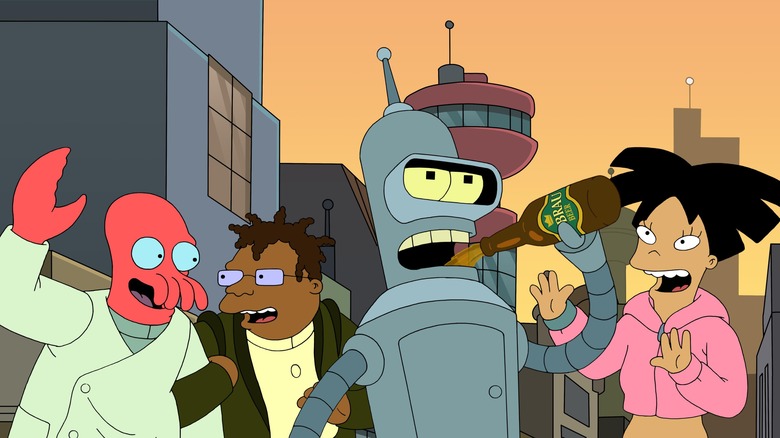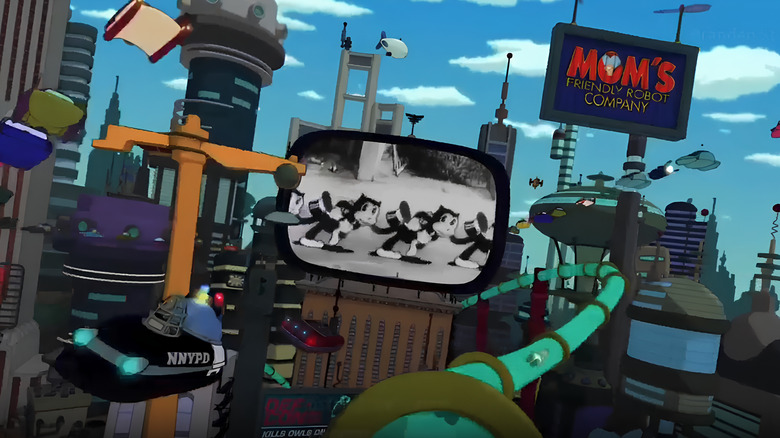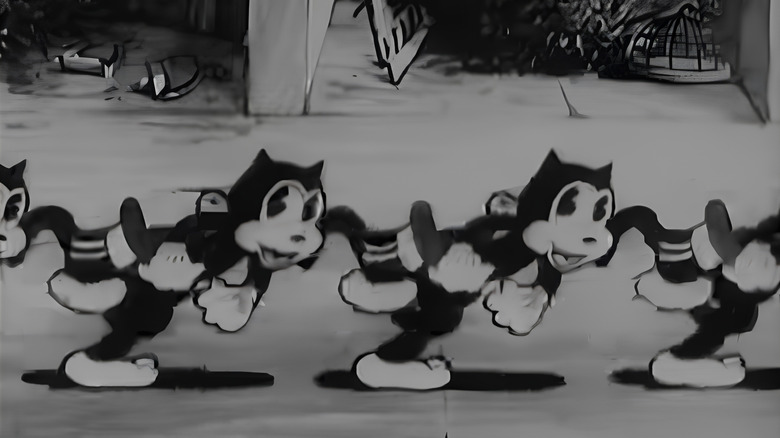Futurama Season 11's Opening Credits Sneaks In An Easter Egg You Likely Missed
"We're back, baby!" declares the robot Bender (John DiMaggio) in the first episode of the oft-canceled animation's revival. After a decade off the air, the madcap sitcom about a man shunted a thousand years into the future has returned, and the first episode is packed with jokes it's been waiting a long time to tell – like the in-universe "Twilight Zone" gag, "The Scary Door," lampooning "Black Mirror." But there's one clever easter egg you probably missed if you hit the "skip intro" button.
Throughout the series, "Futurama" has featured blink-and-you'll-miss-it clips of golden age animated shorts from the early days of American cartoons in its opening theme. Matt Groening loves to add recurring gags to his shows' opening credits, and while the "Futurama" classic cartoon inserts aren't nearly as iconic as, say, the couch gag from "The Simpsons," they're a fun homage to the early days of animated film.
For the first episode of Season 11, "The Impossible Stream," the classic cartoon gag returns, this time featuring a clip from the Max Fleischer theatrical short, "Ain't She Sweet?" featuring Lillian Roth. Released by Paramount in 1933, during what's known as the golden age of Hollywood, it was a marriage of two giants in 1930s cinema. Max Fleischer, the short's animator, was a pioneer in early animation, responsible for creating icons like Betty Boop and Popeye the Sailor. Lillian Roth, meanwhile, was one of the foremost actors and singers of the time.
Animation from Max Fleischer to Matt Groening
Max Fleischer was among the first animators to pioneer synced sound, synchronizing animations and music. A Jewish immigrant from Austria-Hungary, his work did contain some of the predominant tropes of the time, including those borrowed from minstrelsy, but his career didn't remain in that style for long. After founding Fleischer Studios, he produced characters who remain popular today, including Betty Boop and Popeye the Sailor. Additionally, he pioneered the techniques of sound-syncing and rotoscoping, both of which are taken for granted today.
It's safe to say few animators throughout history have come close to matching Fleischer's influence on the medium, but Matt Groening is certainly a contender. His characters from "The Simpsons" and "Futurama" are ubiquitous in contemporary American culture and have even taken on a second life in the age of memes and reaction GIFs. Every news story has an appropriate Groening screenshot waiting in response. In fact, it's safe to say that adult animation owes its enduring popularity to Groening. His shows revitalized the medium when cartoons had been widely deemed children's media, opening the door for the wealth of adult animation we enjoy today.
Using one of Max Fleischer's most popular animated shorts in the opening credits of "Futurama" Season 11, Episode 1 shows just how far animation has come in the past century.
Futurama's credits Easter egg recalls the disturbing and fascinating history of American Animation
The 1933 Max Fleischer animated theatrical short, "Ain't She Sweet," featured in the opening credits of the "Futurama" Season 11 premiere, harkens back to the complex history of American animation, a history both rich and fraught with uniquely American darkness.
Early American animations were often inspired by the tradition of musical revue, a form of entertainment that began with live performers on stages who performed choreographed routines to music. One aspect of revue that unfortunately cannot be overlooked is the inspiration it took from the racist practice of minstrel shows, musical stage routines in which a white person would wear black face paint to mockingly caricaturize black people, often leaving rings of white around the eyes and mouth to emphasize expressions.
Minstrel performers were known for their exaggerated body movements and facial expressions, which translated well to animation and remain a core feature of the medium. Therefore, many early cartoon characters were zoomorphic interpretations of minstrels, complete with wide, white rings around the eyes and mouth. Many early cartoons contain racist or antisemitic stereotypes so outdated that they're nearly unrecognizable to modern audiences.
The three cat-like zoomorphic cartoons line-dancing in the "Ain't She Sweet?" clip at the start of "Futurama" Season 11, Episode 1 is far from the most egregious examples of minstrelsy in golden age animation. Still, it's a product of the same inspiration. As historian Nicholas Sammond puts it in his book, "Birth of an Industry: Blackface Minstrelsy and the Rise of American Animation," "Cartoons didn't borrow from minstrelsy, they joined it" (via Vulture).


